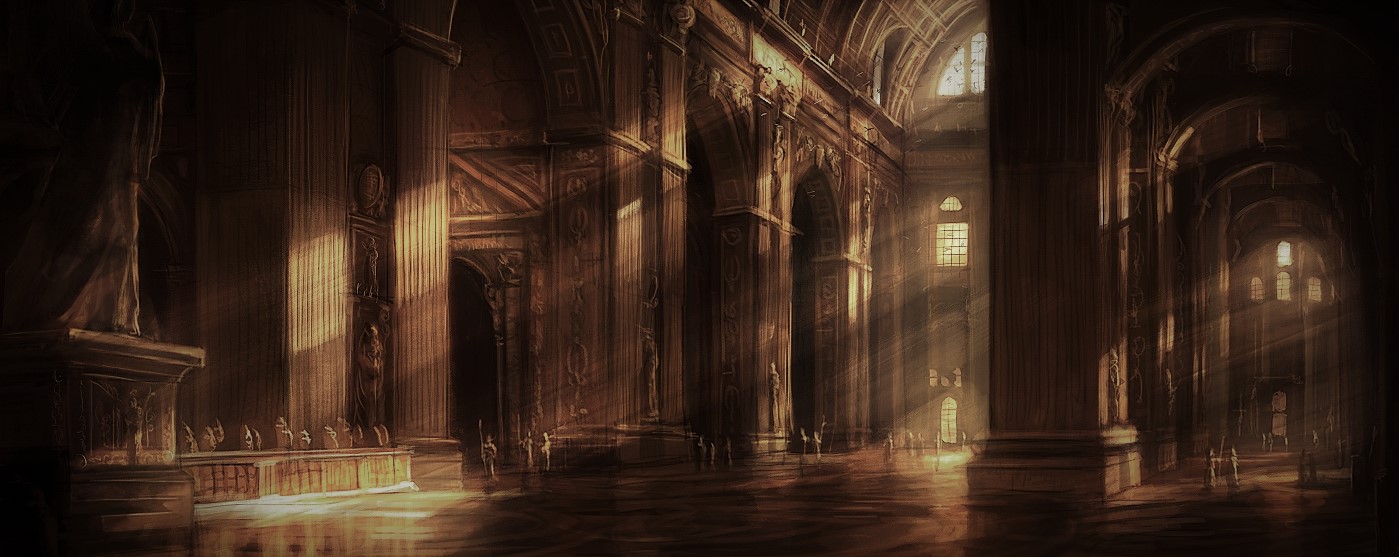The Royal Seminary
The Royal Seminary is one of the largest and most influential religious organizations in the known world, and counts its members among the foremost theologians, historians, and practitioners of law in all of the civilized world. Only the Church of the Inheritor or the Wings of Eshar have a comparable size or scope.
The Seminary's primary role is to subordinate religious and divine activity to the Kingdom of Svain. During the later centuries of the Turathi empire, and the years of secession and rebellion, divine worship was mostly a local affair. Towns might band together to build a shrine, support a small cadre of priests, or have local officials conduct acts of cult worship in order to secure the gods' favor and appease the more superstitious populace. However, there was no unified agreement on which, if any of those practices were legitimate, or worthwhile.
Because of this, it was difficult for the rebels to build a cohesive movement and unify the people under a single cause. After faltering many times, and only with a coalition of several powerful spiritual leaders were the rebels able to spread their mission to the masses. In exchange for their loyalty, those spiritual leaders were given authority over the matters of divinity in the new kingdom, some degree of influence over the matters of state.
Currently, the Royal Seminary is responsible for advising the government on the wishes of the gods, legislating and administering religious practices and observances in the kingdom, and mediating disputes between the monarchy and the senate. Foreign travelers often underestimate the state’s interest in the will of the gods, thereby overlooking the influence the members of the Seminary wield. They hold mandatory advisory positions in both the royal court and the senate, and they are the final arbiters of political appeal. Should the Crown and the Senate come to an irreconcilable impasse, the Royal Seminary delivers final word on a given matter, though this power has only rarely been used.
In Svain, not all priests and spiritual leaders are members of the Royal Seminary. A priest must apply to become a novice, in which they require sponsorship by a number of current members and support from a local region. Once admitted, novices usually undergo several years of education before they are ordained as an Tutor. Tutors may return to their original communities, and their title grants them new powers and responsibilities, such as the ability to serve on local councils, request funds for projects, advise in legal disputes, administer sacred rites and enforce divine doctrine on local priests, and they may call upon local authorized to enforce those regulations.
If they wish, Tutors may choose to further their divine education instead, and gain enough influence to exercise some control in shaping the theological course of the realm. There are several Colleges throughout Svain, each lead by a Dean. The Deans are responsible for administering the college as a whole, and for representing their college in the Divine Council. The Divine Council is the seat of religious power, and is located in capital. It selects membership from the colleges every few years and supervises the practices of divine worship in the kingdom.
The Divine council also elects five Hierophants, who serve as advisors to the royal court and the senate and are final arbiters in matters of political conflict. They hold immense political power and influence and serve as the Kingdom’s High Priests.--
If they wish, Tutors may choose to further their divine education instead, and gain enough influence to exercise some control in shaping the theological course of the realm. There are several Colleges throughout Svain, each lead by a Dean. The Deans are responsible for administering the college as a whole, and for representing their college in the Divine Council. The Divine Council is the seat of religious power, and is located in capital. It selects membership from the colleges every few years and supervises the practices of divine worship in the kingdom.
The Divine council also elects five Hierophants, who serve as advisors to the royal court and the senate and are final arbiters in matters of political conflict. They hold immense political power and influence and serve as the Kingdom’s High Priests.--
Type
Government, Leadership


Comments